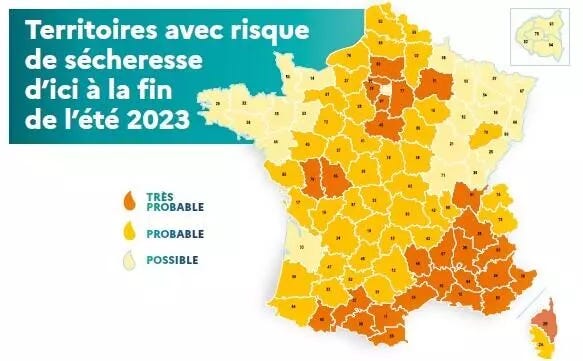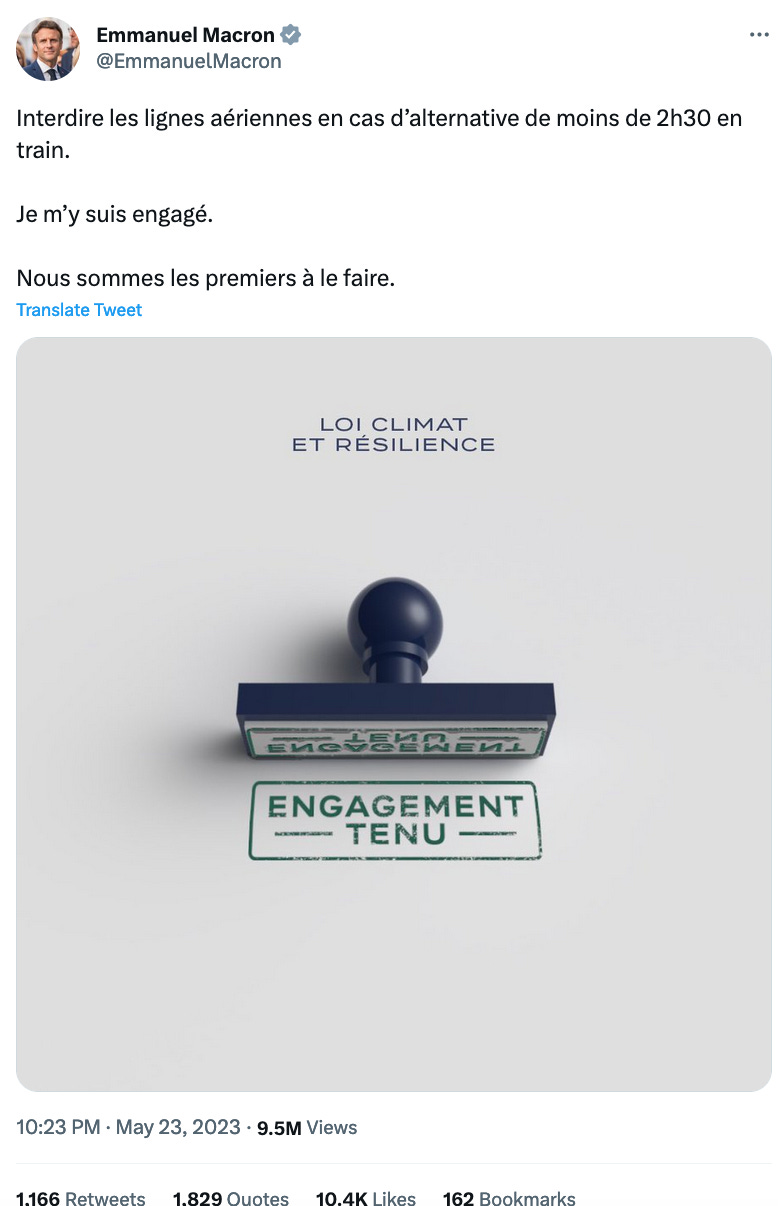Not Easy Being Green
France wants to take the lead in fighting climate change, but adopting the necessary environmental policies is proving to be tough.
Since he was first elected president in 2017, Emmanuel Macron has tried to portray himself on the international stage as a leader in the fight against climate change. At home, however, he’s failed to convince the French of his eco-credentials.
As his government tries again to turn the page on the bruising retirement reform fight, he’s putting climate change at the center of his political agenda. Or, at least trying to.
Last week, Prime Minister Elisabeth Borne presented a set of decarbonization targets the government wants to meet by 2030. She is trying to live up to the lesser-known portion of her official title: Première ministre, chargée de la planification écologique et énergétique. She even made her speech to the National Council for Ecological Transition (CNTE) while surrounded by a gang of a dozen ministers to demonstrate she is totally taking the whole planet meltdown thing seriously.
Alas, the plane turned out to be less Borne Ultimatum and more Borne Fuzziness that offered broad strokes. The targets call for reducing emissions from buildings by 53%, the energy sector by 42.5%, and industry by 37.5%. Looking at this another way, about half of the emissions cuts will be made by businesses, 25% by local governments, and another quarter by households.
The government is treading carefully to avoid a repeat of the backlash that occurred when it implemented a gas tax hike to fight climate change and triggered the Yellow Vest protests. Thus, making it clear that everyone must share the pain.
Borne promised more deets by the end of June-ish. But one thing the plans are not likely to include is a wealth tax.
That’s awkward because a government-appointed economist, Jean Pisani-Ferry, just submitted a report to Borne that recommends a wealth tax on the financial assets of the nation’s richest 10% along with a massive increase in debt spending to fund the estimated €70 billion budget needed for climate initiatives.
With the planet burning, Macron’s ministers naturally sought to reassure the wealthiest that no such tax was under consideration.
"Our policy is to lower taxes, to lower the tax burden in a country that has the highest tax burden of all developed countries," Economy Minister Bruno Le Maire said during a radio interview. Phew!
Not surprisingly, critics who had likely spent the previous night sharpening their knives, were underwhelmed by the Borne plan. They noted that without proposals for the actual policies and how they would be financed, there didn’t seem to be much there there.
"It is often difficult to establish precisely whether a given measure is the responsibility of households or companies. For example, the renovation of housing concerns individuals, companies, and local authorities alike," Anne Bringault, of the Climate Action Network (CAN), told Le Monde.
"The prime minister and her government now have a huge responsibility: to redraft their plans to come back by the summer with all the structuring measures to be activated,” Pierre Cannet of the World Wildlife Fund, told reporters.
But…if there seemed to be some goodwill silver lining, many of the activist groups did seem pleased that the government was at least consulting them as part of the planning process. Much of the lingering bitterness over the retirement reform stemmed from the lack of negotiations in advance plus the decision to use an administrative end-run to adopt it without a vote by the National Assembly.
Hitting these targets will be difficult. European Union countries have agreed to cut their CO₂ emissions in half by 2030 compared to 1990 levels. So for France to hit that mark, reductions over the next 8 years would have to be twice as much as what’s been achieved over the past 30 years. You don’t have to be Descartes to know that makes for some tough math. Or, as the British would say, maths.
Still, if politicos need the motivation to take action, they just have to look around the nation to see some fairly alarming signs that the end is nigh.
Apocalypse Now
Just a few weeks ago, Environmental Minister Christophe Béchu released a fun map of the 28 departments in France that are most likely to experience a drought sometime this summer. Check out this exciting national guide to drought! There are 96 departments in France, and all of them are at some level of risk. As of April, 68% of France’s groundwater levels were below average, according to RFI.
So, 2022 saw record-high temperatures, little rain, and lots of wildfires. Forecast for 2023: More of the same, but worse. That was the conclusion of a French geological survey (BRGM) released this month which offered cheery projections such as: “From May, the groundwater level will most probably remain low until the autumn.”
The drought framework gives guidance to local officials, prefects, to trigger emergency water restrictions. That includes bans on using water for swimming pools or golf courses, the latter of which are scrambling to find alternatives. In one case, the prefect of the Pyrenées-Orientales in the southwest of France has already forbidden the use of inflatable swimming pools. The PO has already celebrated its first wildfire of the year, which is ominous.
Our former hometown of Toulouse is developing 30 emergency heat and drought measures, according to Le Monde. Dubbed Toulouse + fraîche, the plans feel a bit like using a sponge to stop a tidal wave:
Opening hours for swimming pools, parks, museums, media libraries and recreational bases will be extended, sometimes late into the night. Blinds and water points will be installed in about 20 schools (just under 10% of municipal schools) this summer. Half of the city's leisure centers will also be equipped with "heat wave kits" comprising two thermometers, two mobile air conditioners and a case of water games. In some retirement homes, vegetation planting work is underway and installation of shade canopies is planned.
The city also plans to create “cool” spaces with temporary shade structures to offer some relief. This includes hanging ribbons along Rue Alsace, one of the main commercial districts, to make it possible for shoppers to venture out in the blazing heat.
Here are some more fun facts about France and drought: Two of the nation’s main sources of energy are nuclear and hydroelectric. Both require lots of water and so when there isn’t much water, there will be cuts to electricity.
And speaking of cuts, Nestle has announced it would stop drawing water from two wells in Eastern France because of drought conditions that are impacting the quality and availability of the source of mineral water. Of course, bottled water comes with all sorts of ethical quandaries in this era. But Nestle Waters employs 600 people in this region and pays the local government about €4 million annually on commissions of sales of that water.
So, if the water goes bye-bye, so do the local economic benefits.
Bicycle Boom
While the impact of climate change policies remains to be seen, one thing never in short supply is announcements of new plans by the French government.
As part of the eco-flurry of announcements, the French government unveiled a €2 billion plan to expand cycling infrastructure as part of a broader effort to encourage people to ditch their cars by doubling the nation’s bike lane networks.
Currently, France has 50,000 km of bike lanes. The government wants to increase that to 80,000 by 2027, and 100,000 by 2030, according to Reuters.
“Today, half of our trips by car are less than 5km,” Transport Minister Clement Beaune said in a tweet. “That’s immense potential for bikes. With the Plan Velo, we’re mobilizing €2 billion to accelerate the deployment of bikes everywhere in France.
"The state's bicycle effort is unprecedented and massive," he added.
France’s Plan Velo also includes €500 million for subsidies to help more people purchase and maintain bikes. Money will also be allocated to create more areas for parking bikes as well as bike training for 850,000 younger school children.
The government is also considering updates to traffic rules to make roads more biking-friendly, subsidies to encourage more domestic production of bicycles and the promotion of cycling tourism.
Cycling groups said France would need to be even more aggressive if it wants to meet its climate change goals, according to the Fédération française des usagers de la bicyclette (FUB).
“The Plan Vélo's recipe for success will be based on 3 pillars: investing, facilitating, educating,” FUB said in a tweet. “Today's announcements breathe new life into the actors, but the Government will have to roll up its sleeves for action to meet the climate, health, and social challenges.”
Charging Ahead
Another area of emphasis is the transition to electric vehicles. So good news-ish here: France has belatedly passed a national goal to establish 100,000 public charging stations for electric cars as the country seeks to accelerate the development of a sector deemed critical for fighting climate change.
AVERE, the European Association for Electromobility, recently announced that France had hit the milestone and now only lags the Netherlands in terms of public charging stations. The French government is now racing to meet a new goal of installing 400,000 charging points by 2030, according to Le Monde.
This comes as the pace of deployment continues to accelerate. Prior to 2020, France was averaging less than 5,000 new public charging stations each year. Now the country is seeing up to 4,000 every month, according to AVERE.
These numbers do not include private charging stations which number more than 1 million, according to Enedis, the electricity distribution network manager
Clearing the first hurdle showed just how complex it will be to reach the energy transition goals.
Back in October 2020, Transportation Minister Jean-Baptiste Djebbari set a goal of 100,000 charging stations by the end of 2021. But by March 2022, the country had only reached 57,732.
Getting large highway operators to move with urgency proved a challenge. In response, these companies said they were not sure there was enough competition in the sector in terms of companies that build and maintain charging stations.
At the same time, local governments were slow to allocate space for the placement of these stations.
Still, the push to get this infrastructure in place has encouraged venture capital investors to pour money into French startups that deploy networks of charging stations.
For instance, mobility startup Yespark raised €28 million to build 30,000 charging stations by 2025. French startup Bump recently announced a $180 million funding detail in partnership with DIF Capital Partners to roll out a network of charging stations in partnership with different commercial spaces.
ZePlug, which places charging stations in multi-occupant and office buildings, announced that it has raised €250 million. And NW Groupe, which provides a range of services related to renewable energy that includes charging stations, raised €300 million in July 2022.
"We know how to orchestrate the deployment," Yespark co-founder Thibault Chary told La Tribune. "That is to say that we have both hands on parking spaces, but also service provider electricians, just as we work with the Enedis network manager and electricity suppliers."
Across Europe, the market for building charging stations is red hot. According to one market research firm, the value of this market in Europe will reach $61.73 billion by 2029. In addition to France and the Netherlands, the other top 5 European markets include Germany, Norway, and the UK.
The charging infrastructure is also essential for countries to meet a new European Union rule that will prohibit sales of gasoline-powered cars starting in 2035.
For the moment, the bulk of these charging stations falls in the low-charging category. According to AVERE, 86% of France’s stations are 22 kW or less. Consumers tend to prefer this level of service because charging costs are much lower, according to AVERE.
Plains Vs Trains
Finally, the government officially adopted another greeny policy that made international headlines: France has banned many short-haul domestic flights. Such routes are no longer allowed if there is an available high-speed train service that offers a route that is less than 2.5 hours.
“As we fight relentlessly to decarbonize our lifestyles, how can we justify the use of the plane between the big cities which benefit from regular, fast, and efficient connections by train?” Transport Minister Clément Beaune, who has been a busy eco-beaver, said in a statement.
On the surface, that sounds seismic. In reality, it only impacts 3 flight routes from Paris-Orly Airport to Nantes, Bordeaux, and Lyon. The government plans to test the policy and then re-evaluate it in 3 years for possible expansion. Assuming the country is still around.
“Prohibit flights in the event of an alternative of less than 2h30 by train,” Macron tweeted. “I committed to it. We are the first to do so. Promises kept.”
When originally announced in 2019, the proposed law would have banned any such flights if there was a train option of less than 4 hours. But that was dropped because airlines pitched a fit. As such, environmental groups remain unimpressed with the watered-down version officially adopted last week.
And this perhaps best captures the disconnect between Macron’s international image and his domestic one. He can justifiably brag that France is the first to take this step as other countries dawdle. And yet, he retreated from the more ambitious steps that scientists and activists say are urgently needed to fight climate change.
“All that fuss, for not that much,” Geneviève Laferrère, who handles transportation issues for France Nature Environnement, a federation of environmental defense groups, told The New York Times. “There are so many constraints that the effectiveness is gone.”
Chris O’Brien
Le Pecq







Good one ! One question: « Assuming the country is still around. »? Or the govt is still around ? 😆